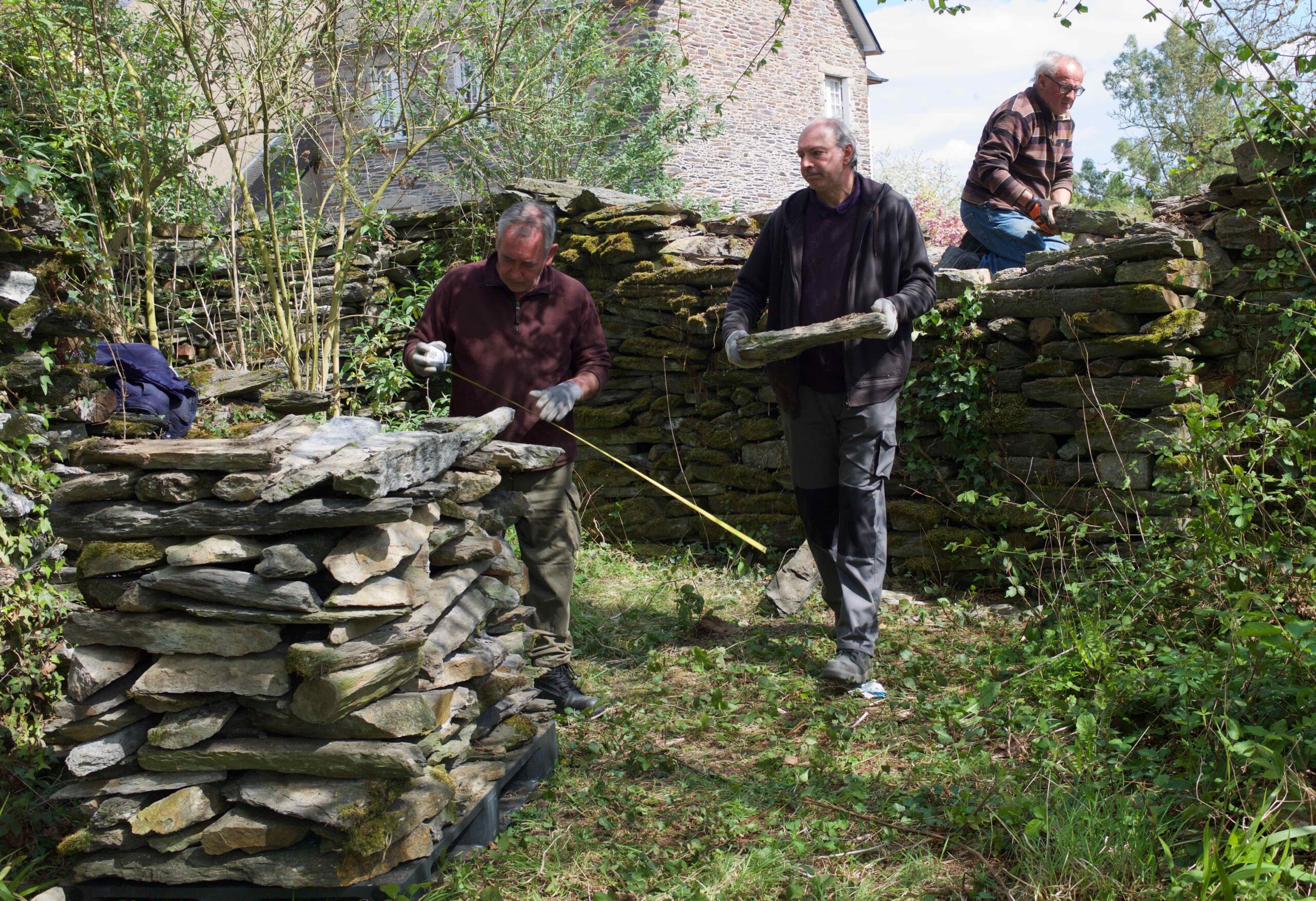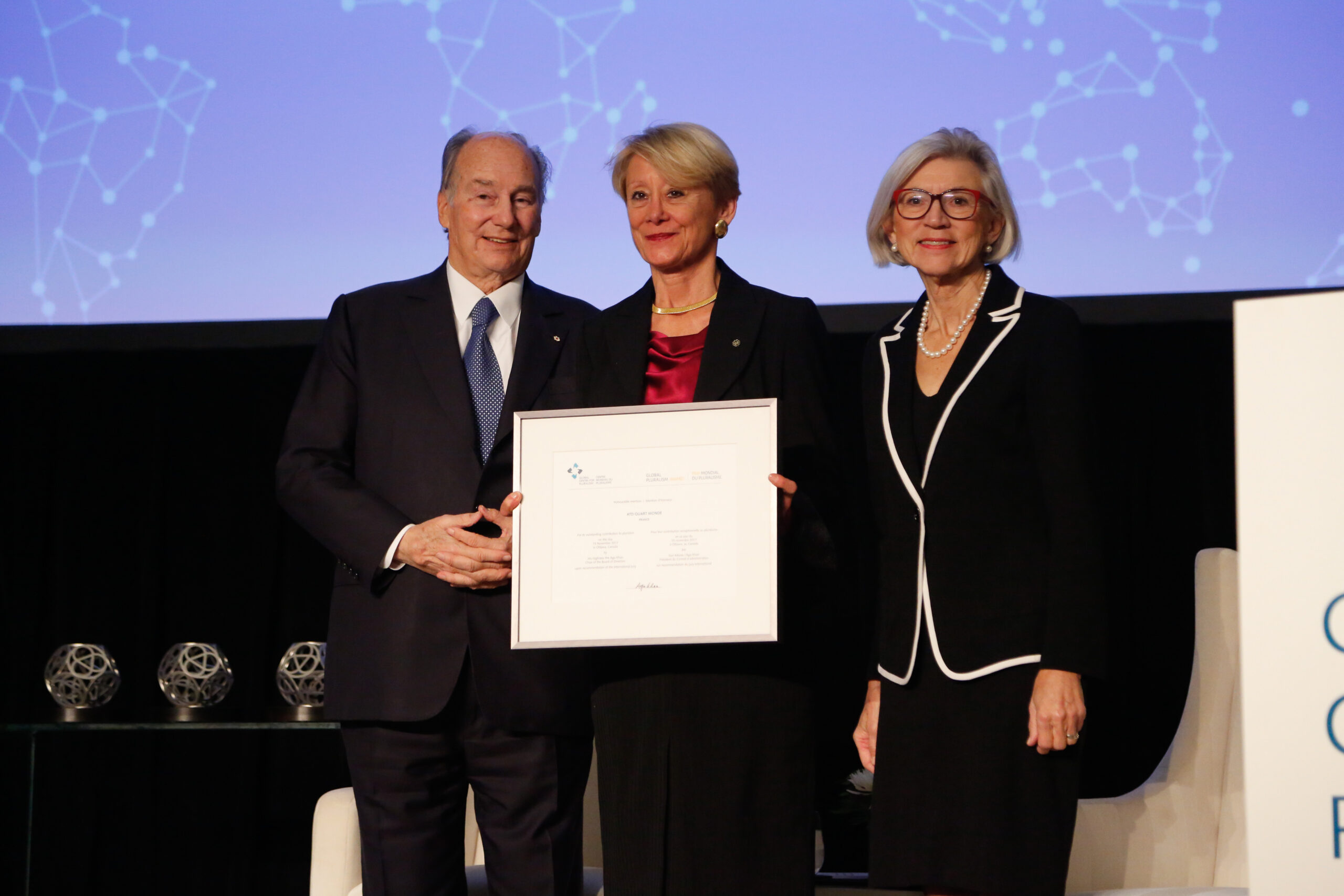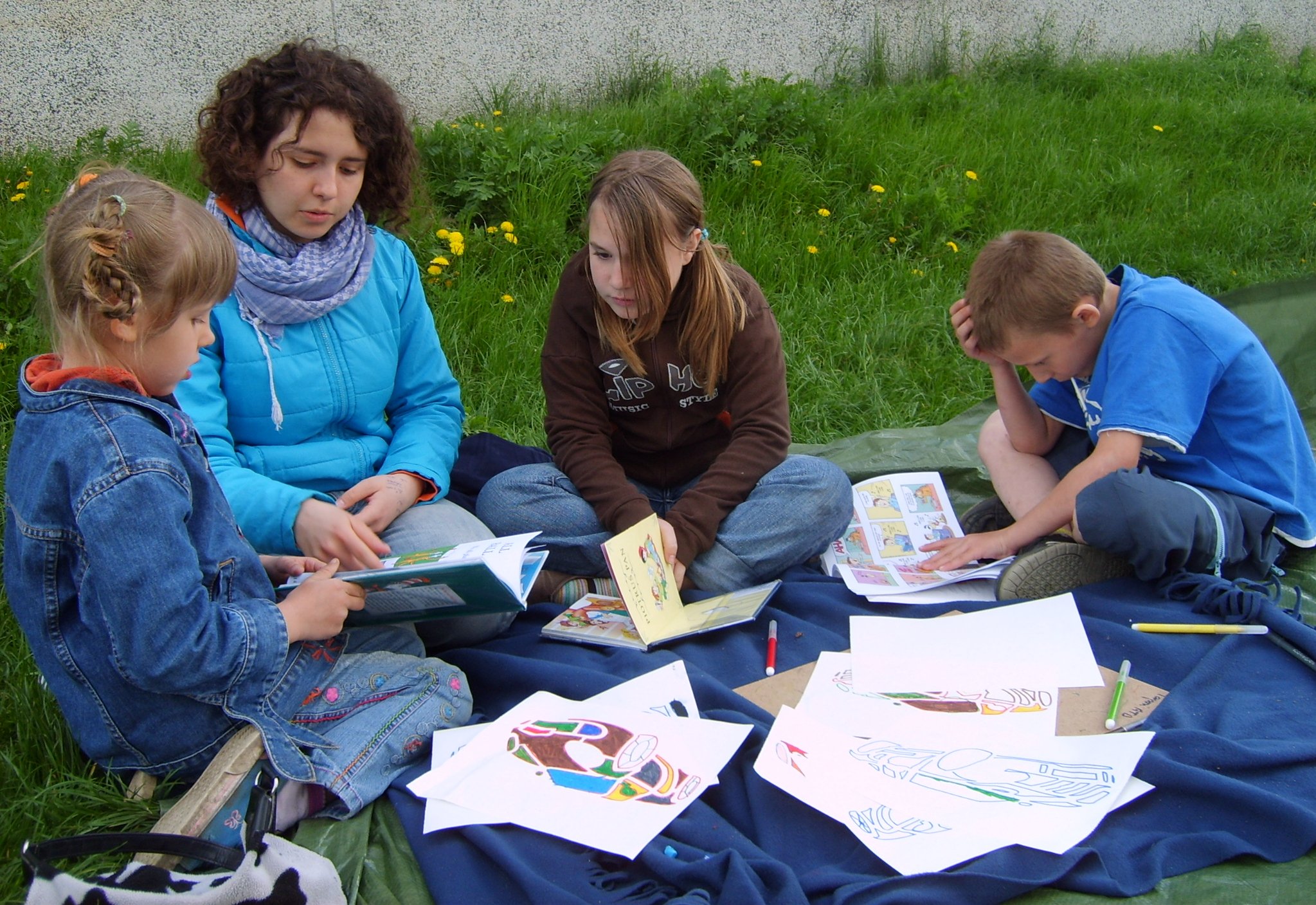Welcoming America
Welcoming America’s Story
When David Lubell was five years old, his parents sat him down and told him: Don’t talk to strangers. It’s a common refrain, but it led David to feel fear for the first time.
Today, decades after David received what he calls “the stranger danger talk,” the United States is experiencing the fastest immigration growth rate since the early 1900s. Also on the rise is anxiety and mistrust in communities with high rates of immigration, hate crimes targeting foreign-born residents, anti-immigration policies, and alienation between immigrants and long-term residents.
David was living in Tennessee when he realized that despite his state’s 400 per cent increase in immigration in the past decade, there was no widespread coordination of efforts to help immigrants. He also noticed that there was no effort to prepare host communities for the major demographic changes they were facing. David launched Welcoming Tennessee in 2006 to help immigrants become active members in their new society—with the support of their host communities. Now, Nashville, Tennessee, has grown to become an economic leader in this region. Civic and business leaders attribute this success to the city’s welcoming climate and successful integration of immigrants.
Welcoming Tennessee soon became Welcoming America, an award-winning non-profit organization that builds bridges between newcomers and long-time residents. The organization has developed a Welcoming Standard, which provides a comprehensive roadmap for immigrant inclusion. It encourages interactions between immigrants and their receiving community to build trust and help local leaders involve newcomers in the city’s planning. Today, Welcoming America has created more than 570 inclusive policies and programs to improve the lives of immigrants by helping them learn English, succeed at school, build a career, open a business or participate in civic life. Welcoming America has expanded to 380 communities across the United States, and has partnerships in Germany and Australia.
At the heart of the organization is the belief that when newcomers feel valued and are encouraged to participate in the social, civic, and economic fabric of their adopted hometowns, everyone benefits. Communities become better—more vibrant and more prosperous—when they embrace diversity and nurture the potential of their new residents.
Wapikoni
Wapikoni’s Story
Quebec filmmaker Manon Barbeau was deeply troubled by the suffering and high rates of suicide she had witnessed among indigenous youth in Quebec. She produced a full-length film featuring the voices of 15 youth and, in the process, formed a particularly strong bond with a young woman named Wapikoni Awashish. When Wapikoni was killed at the age of 20 by a logging truck, Manon felt she had lost a daughter. Two years later, in 2003, she decided to honour the memory of her friend.
Noting the ease and joy that came over indigenous youth as soon as they had a camera in hand, Manon partnered with First Nations of Quebec and Labrador Youth Council and the Atikamekw Nation Council to create Wapikoni Mobile, a non-profit organization that gives voice to indigenous youth through filmmaking.
Wapikoni Mobile is the only mobile studio in Canada that travels to remote indigenous communities to teach youth filmmaking techniques with state-of-the-art technology, which they use to create their own short films and musical works. Wapikoni Mobile then distributes their work, organizing 200 screenings per year at locations ranging from remote high schools to prestigious film festivals. Following the screenings, the young directors are encouraged to speak about their work, which forges new relationships between indigenous and non-indigenous people with a view towards reconciliation.
Wapikoni Mobile has also established the International Network for Aboriginal Audiovisual Creation, which uses cinema to promote respect for indigenous rights and social inclusion throughout the world. Today, Wapikoni Mobile has mentored 4,000 youth from five First Nations in Canada, and 17 communities throughout five countries in Latin America.
Though the organization has won several awards and garnered international acclaim, its success is best measured by the accomplishments of its participants, who are appearing at the Sundance Film Festival and in university classrooms, winning full scholarships at prestigious international film schools, starting the Idle No More movement, and speaking at the United Nations Permanent Forum on Indigenous Issues. Through their films they have contributed to the fight against racism, prejudice and isolation that Canada’s First Nations have suffered for generations. Wapikoni Mobile set out to engage indigenous youth living in remote communities, and in the process it has deeply enhanced filmmaking in Canada with new voices and perspectives.
Sawa for Development and Aid
Sawa for Development and Aid’s Story
In December of 2011, 22-year-old was visiting her family in Lebanon when she heard about the first 40 Syrian refugees crossing the border into Lebanon. She got into a car and drove to meet the refugees. After asking them what they needed, she sent a text message to everyone she knew, explaining the tragic situation and the families’ urgent needs. Her message spread, prompting hundreds of people to contact her with offers of donations or to volunteer.
By the end of 2011, Rouba Mhaissen had created Sawa4Syria, a grassroots youth-led initiative that was one of the first organizations in Lebanon dedicated to responding to the needs of Syrian refugees. The name Sawa means “together.” Soon, the organization expanded to become the non-profit organization Sawa for Development and Aid, which provides multi-faceted relief for Syrian refugees in Lebanon and, now, in the United Kingdom.
In addition to traditional humanitarian relief, which it provides in 18 tented camps to thousands of refugees, Sawa incorporates education and livelihood programming to help refugees become financially independent. In their free kitchen, run by Syrian and Lebanese volunteers, Sawa feeds more than 5,000 people on a daily basis. Their educational centre prepares Syrian children for entrance into Lebanese schools, and their cash-for-work programs employ around 50 refugees at any one time.
With more than 1.5 million Syrian refugees in Lebanon, tensions have risen between refugees and their host communities, an issue Sawa is addressing through education and outreach in Lebanon. All of Sawa’s programming is conceived, designed and implemented by refugees, which ensures that its work is directed at the issues that matter most to the people it helps.
When Rouba drove to meet the first Syrian refugees in 2011, she did not know that, six years later, she would have started an organization with a wide network of local and international partners that is meeting the needs of Syrian refugees in Lebanon and the United Kingdom. In 2011, she simply asked, “What do you need?” She discovered that, beyond humanitarian relief, they needed to be given a chance to contribute in meaningful ways to their new society. She also learned that Lebanon, by embracing diversity, has become a richer, more tolerant place in which to live.
Hand Talk
Hand Talk’s Story
In a hospital emergency room in the northern Brazilian province of Alagoas, Doctor Davi Freitas was trying to communicate with an agitated 13-year-old girl. No one, including the girl’s mother, could figure out what was wrong because the girl was hearing impaired. Suddenly, Doctor Freitas remembered that he could ask Hugo.
Hugo is the virtual interpreter for Hand Talk, a Brazilian social enterprise that creates technology to offer automatic translation from spoken language into Libras, the Brazilian sign language. With Hugo’s help, Doctor Freitas was able to determine that his young patient had a terrible headache, which turned out to be a warning sign of intracranial bleeding, for which she was immediately and successfully treated.
Hugo can be found throughout Brazil, from hospital emergency rooms to classrooms to bars. With purposefully oversized hands and carefully designed, complex facial expressions, Hugo is a sign language interpreter you can take with you anywhere.
There are more than 360 million deaf people in the world, and 10 million in Brazil. Often, deaf people encounter difficulties with literacy, since the written language relies on phonetic learning. In Brazil, more than 70 per cent of deaf people have difficulty communicating in their native language. Founded in 2012, Hand Talk helps deaf people break down communication barriers that stand in the way of their education, inclusion and independence.
Hand Talk has been recognized with eight international and regional awards, including being chosen by the United Nations as “the best social app in the world.” Already, over 1 million people have downloaded the app and Hugo processes some 6 million translations every month. As Doctor Freitas discovered, the app has the potential to save lives in an emergency situation. More common, however, is its ability to improve lives by helping deaf people become active participants in society.
Fundación Construir
Fundación Construir’s Story
Following President Evo Morales’s electoral victory, the Bolivian Constituent Assembly convened on August 6, 2006, with the purpose of drafting a new national constitution. Fundación Construir began as a panel of experts hired to advise the Assembly on how to integrate western and indigenous legal systems in the new constitution, ensuring an emphasis on the many different national groups that make up Bolivia. By enabling dialogue between politicians, judges and indigenous communities, the panel contributed to three historic articles recognizing traditional indigenous practices of law and conflict resolution.
The panel of experts became Fundación Construir in 2008, and since then it has continued helping policy-makers, judges, and indigenous communities implement the new constitution’s inclusive vision of the law, to build a pluralistic Bolivia. Construir, indeed, means “to build.” It is not an easy task. Bolivia has 36 official languages, 50 indigenous nations, and more than 2,000 different legal systems. It is a polarized country where consensus is hard to reach.
Construir works as a think tank and a convener. It produces valuable research, such as a comprehensive mapping of indigenous legal systems, and then acts as a link between the state and indigenous communities, ensuring that best practices are followed when jurisdictions work together. Construir also provides training in indigenous communities to ensure their full integration within the justice system and trains judges and other public servants to help them advance respect for traditional indigenous justice.
Construir has also helped develop the skills of hundreds of indigenous women, who now act as community leaders linking remote communities with institutions. These women have been granted the legal status of “community advocates” and have been instrumental in the fight against human trafficking and violence against women and children.
In a country with so many disparate groups and challenges, the work of Construir can be a balancing act. It is sustained by a belief in human rights and a pluralist vision of justice, one that represents every single member of Bolivia’s diverse population.
BeAnotherLab
BeAnotherLab’s Story
We have all heard the old adage: before you judge someone, walk a mile in their shoes. But how, exactly, do you do that?
BeAnotherLab has an answer. A multinational group headquartered in Spain with nodes in ten other countries, BeAnotherLab unites artists, scientists, researchers, anthropologists and practitioners to help reduce implicit bias and promote empathy through virtual reality technology that creates an “embodiment” experience, the illusion of being in another person’s body and seeing the world through their eyes.
Their Machine to Be Another has been applied to art, conflict resolution, scientific research, social issues, healthcare and education in various public spaces in over 20 countries. At the 2015 United Nations General Assembly, delegates could see themselves in the body of Nicole Goodwin, an American poet and Iraq war veteran, while listening to her talk about the harm the war brought to her life. With the help of Oculus Rift headsets, first-person cameras, and synchronized movements, participants have even swapped genders. Others have experienced reality from the perspective of a person with physical disabilities; or a mother of a young black man murdered by police; or a Sudanese refugee at the Holot Detention Center in Israel. Following the experiment, participants meet in person to discuss the experiment and share their stories.
BeAnotherLab’s current focus is the Library of Ourselves, a long-term project that helps participants better understand themselves, by understanding others. Working through cultural and educational institutions around the world, BeAnotherLab offers its methodology and immersive virtual reality technology to create content, what they call “embodied storytelling,” and engage with different audiences in an effort to create transformative encounters between communities in conflict.
In a world that often divides us by our differences, BeAnotherLab wants to instead highlight our shared human experiences. As BeAnotherLab co-founder Philip Bertrand said, “More than individuals, we are part of a broader system called humanity.”
ATD Quart Monde
ATD Quart Monde’s Story
In 1957, having just arrived in France to serve as chaplain to 250 homeless families, Father Joseph Wresinski walked through Noisy-le-Grand, an emergency housing camp near Paris. The conditions in the camp were appalling: sheet-metal huts in a muddy field, four water pumps for over a thousand people, and children dying of cold or of fire when makeshift heating systems malfunctioned.
A child of poverty himself, Father Joseph understood the people in Noisy-le-Grand. One of the first things he did was replace the soup kitchen and used clothing dispensary with a library and kindergarten. This sent a clear message, one that is still at the core of the ATD Quart Monde movement. People living in poverty do not need pity and charity; they need to be involved in the fight against poverty. They need to have their voices heard by decision-makers.
“I will take you up the steps of the Élysée, the United Nations and the Vatican,” Father Joseph promised the families in Noisy-le-Grand. At the time of his death in 1987, after 30 years of alliance-building and advocacy work, he had brought them to speak to the highest authorities in France, and with diplomats at the United Nations. The visit to the Vatican was not far behind, occurring two years later.
The community development project that Father Joseph began in Noisy-le-Grand grew to become ATD Quart Monde, an international organization headquartered in Paris dedicated to eradicating poverty and empowering the world’s most disadvantaged people. ATD stands for All Together in Dignity, and, true to its name, the movement has united thousands of people from all political, religious, cultural and socioeconomic backgrounds from 34 countries.
In France, ATD Quart Monde has helped include marginalized groups into society through structural and legal changes, an essential component of pluralism. For instance, it was instrumental in passing a minimum welfare income for the unemployed, universal health coverage, and the enforceable right to housing. Half of the social assistance in France today stems from ATD’s actions. On the international level, ATD Quart Monde is represented at UNESCO and the United Nations.
From the muddy fields of Noisy-le-Grand an international movement was born. Today, it unites people from five continents and from all walks of life in the work of building a better, poverty-free world.



Soliya
“Soliya is at the forefront of its field – harnessing technology as a bridge across differences to connect and engage young people. It is a young success story, already increasing empathy and understanding among its participants, and helping a new generation of leaders set foot into the world with a direct personal experience of the values of pluralism, and a commitment and capacity to confront its biggest challenges.”
Joe Clark, former Prime Minister of Canada and Chair of the Global Pluralism Award Jury.
Soliya’s Story
At a moment in time before Facebook, Twitter, and Instagram, two forward-thinking founders recognized how sustained dialogue in the digital space could change the world — for good.
Soliya, a United States 501(c)3 not-for-profit headquartered in New York, was launched in 2003 by Lucas Welch and Liza Chambers as a response to the growing distrust in a post-September 11th society. Soliya pioneered a field that is now called Virtual Exchange, bringing together young people across cultures and continents in synchronous online dialogues that instill the skills to think critically, approach with curiosity and lead with empathy.
Guided today by chief executive Waidehi Gokhale, Soliya employs the Exchange Portal, a custom videoconferencing platform, through which its global team brings together over 5,000 young adults each year in small, diverse groups as part of the Connect Program. Discussing current events with trained facilitators, participants from the United States, Canada, Europe, Middle East, North Africa, and South and Southeast Asia learn that people’s identities are multi-dimensional. By voicing and listening to one another’s stories, they gain greater understanding and build empathy.
By empowering individuals with the ability to engage with and across difference, Soliya helps future change-makers have the difficult conversations necessary to break cycles of bias. Soliya’s programs are helping participants to eliminate negative notions of ‘the other’ and to thrive in a 21st century society. To date, Soliya has worked with over 220 higher education institutions and learning centers in more than 30 countries and 29 of the United States to include programs for credit as part of existing classes across numerous disciplines. That footprint continues to expand with new partnerships. Soliya’s impact has been proven through measurement and evaluation collected in association with the Saxelab Social Cognitive Neuroscience Laboratory, Massachusetts Institute of Technology; the Annenberg School of Communication, University of Pennsylvania; Oxford Centre for the Study of Intergroup Conflict, University of Oxford; and University College London.
Nearly two decades after its inception, Soliya has shown itself to be more relevant than ever, as it bridges divides and builds strong, pluralistic societies.
Research shows that a cross-cultural experience during an individual’s formative years can lead to more cooperative and compassionate relationships. However, accessibility is often an issue. Many young people around the world live in homogenous communities, and, due to socioeconomic, institutional, geographic or personal barriers, have limited opportunities to engage with different viewpoints or identities. A meaningful cross-cultural exchange can drastically shift views of difference.
SINGA
“In today’s media cycle, bad news about migration often eclipses positive stories. The SINGA community offers a much more optimistic outlook. SINGA’s programs have opened up avenues for connection and empathy and are actively challenging misinformation and xenophobia around asylum.”
Joe Clark, former Prime Minister of Canada and Chair of the Global Pluralism Award Jury.
SINGA’s Story
What if migration became a story about opportunity rather than crisis? What if instead of talking about “us” vs. “them,” we focused on the potential of “we”?
Consider the story of two men. Foday is an accountant from Sierra Leone. Cyril is a chartered accountant from KPMG France. The two men get to know each other. Foday makes progress in French, while Cyril discovers that he is not sitting with a refugee, but a fellow accountant, an expert in his field and, ultimately, a new friend.
Picture Donia who started a successful catering company offering cuisine from around the world made by women from immigrant backgrounds.
Learn about Simon who built co-housing project for both refugees and French people.
By connecting individuals, SINGA contributes to safer, more pluralist and creative societies where refugees and migrants, like everyone else, have a role to play. SINGA believes that every individual has the right to belong wherever he or she chooses. This requires creating spaces where people can share meaningful experiences and build lasting relationships and professional networks.
SINGA means “link” in Langala, a language spoken predominantly in the Democratic Republic of the Congo. To link newcomers and their host communities, SINGA and local populations launched a platform where individuals and organization can offer events and programs to help bridge differences and bring people together.
SINGA has worked with over 5,000 refugees and 20,000 locals. Thanks to incredible citizen mobilization and the involvement of organizations, the movement has spread to 19 cities in Europe, with nine other locations on the way, and runs eight incubators dedicated to migration-led innovation. Within nine months of participating in SINGA’s programs, most refugees find jobs, have sustainable housing and can communicate in French thanks to this new social network where they collaborate, create and experience life in their host countries. The benefits of these connections are far from one-sided. There is a deep sense of enrichment on both sides of the exchange because – and this is the only rule of SINGA – newcomers and locals participate TOGETHER.
These relationships are transforming the larger story of migration in Europe from one of distrust to one of friendship and a shared sense of belonging. Last but not least, SINGA’s programs are unleashing creativity and bringing new ideas, projects, associations and companies to life.
Concerns about the mass movement of people exploded into public consciousness in 2015. Refugees and migrants from the Middle East and Africa fleeing drought, poverty and violence began to arrive on European shores. In 2018, the estimated refugee population in France was around 350,000. Xenophobia has spread throughout Europe. Newcomers are portrayed by certain media and politicians as threats or victims, endangering their host society or draining its resources. SINGA was founded to help change perceptions of refugees and asylum seekers in Europe.
Rupantar
“The jury was impressed by Rupantar’s creative approach of using cultural performances to address sensitive social issues. Rupantar is truly working at the grassroots – mobilizing the most vulnerable in Bangladesh, including women and youth – to help build a vibrant democracy.”
Joe Clark, former Prime Minister of Canada and Chair of the Global Pluralism Award Jury.
Rupantar’s Story
Dressed in colourful costumes, performers sing, dance and play instruments on an outdoor stage. “Human rights are violated time and again,” they sing, “and yet the people are not vocal.”
While entertaining, the performance is also a call to action, urging the audience to claim their rights and protect their vulnerable populations. This is a traditional form of popular folk performance called a pot song. It is also one of the many tools used by the non-profit organization Rupantar to address pressing social issues in Bangladesh.
Rupantar, which means “transformation,” has been working in Bangladesh since 1995. The organization was founded by two individuals from different religions who shared a common vision for a just society. In such a complex setting, Rupantar has adopted a truly holistic approach to encourage social change and promote pluralism. Their work covers five programmatic areas: democracy and political empowerment, peace and tolerance, disaster management and climate change adaptation, children and youth rights, and cultural dialogue through popular media and folk theatre. With a diverse staff of 525, the organization is the largest awareness and social mobilization organization in Bangladesh.
Rupantar works at the grassroots level to empower vulnerable populations to be agents for change in their communities. They are especially successful in mobilizing women and youth leaders. For example, since 1998, Rupantar has helped set up 32 government-registered women’s organizations, empowering women to run for and win seats in local elections. Rupantar has also been successful in implementing the Promoting Engagement and Actions for Countering Extremism (PEACE) initiative, which connects youth from different social groups to promote tolerance and pluralism in their communities. They have run more than 200 faith-based dialogues in which Muslim, Hindu and Christian leaders develop action plans to combat extremism.
Rupantar’s work is extensive. Sometimes it takes the form of a dialogue between religious leaders. At other times, it is a pot song on land rights or a climate change awareness campaign. In such a complex country, their approach has to be multi-faceted. What is constant is the organization’s goal of mobilizing Bangladesh’s diverse population to create lasting peace, stability and vibrant democracy.
Bangladesh is one of the most densely populated countries in the world with considerable religious and ethnic diversity. The country’s history is marked by periods of colonial rule, poverty, famine, ethnic tension, political turmoil and military coups. Bangladesh continues to experience substantial economic and social change and faces a number of challenges, including political instability, corruption and discrimination. In recent years, the country’s social unrest has been exacerbated by violent attacks from extremist groups, reports of abuse by law enforcement and a humanitarian crisis caused by the arrival of approximately 740,000 Rohingya from Myanmar.

